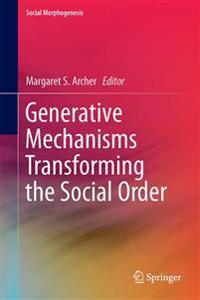Social Origins Of Educational Systems (Inbunden)
avMargaret S. Archer
ISBN: 9780415639033 - UTGIVEN: 2013-01-31Originally published: 1979. With new introd.
Social Origins of Educational Systems (Häftad)
avMargaret S. Archer
ISBN: 9780415639057 - UTGIVEN: 2014-05First published in 1979, this now classic text presents a major study of the development of educational systems, focusing in detail on those of England, Denmark, France, and Russia - chosen because of their present educational differences and the historical diversity of their cultures and social str[...]
Realist Social Theory (Pocket)
avMargaret S. Archer
ISBN: 9780521484428 - UTGIVEN: 199509Building on her seminal contribution to social theory in Culture and Agency, Margaret Archer develops here her morphogenetic approach, applying it to the problem of structure and agency. Since structure and agency constitute different levels of stratified social reality, each possesses distinctive e[...]
Culture and Agency (Pocket)
avMargaret S. Archer
ISBN: 9780521564410 - UTGIVEN: 1996-10Margaret Archer?s Culture and Agency was first published in 1988, and proved a seminal contribution to social theory and the case for the role of culture in sociological thought. Described in Sociological Review as ?a timely and sophisticated treatment?, the book showed that the ?problems? of cultur[...]
Making our Way through the World (Inbunden)
avMargaret S. Archer
ISBN: 9780521874236 - UTGIVEN: 2007-07How do we reflect upon ourselves and our concerns in relation to society, and vice versa? Human reflexivity works through 'internal conversations' using language, but also emotions, sensations and images. Most people acknowledge this 'inner-dialogue' and can report upon it. However, little research [...]
The Relational Subject (Pocket)
avPierpaolo Donati, Margaret S. Archer, Pierpaolo Donati
ISBN: 9781107513952 - UTGIVEN: 2015-06Many social theorists now call themselves 'relational sociologists', but mean entirely different things by it. The majority endorse a 'flat ontology', dealing exclusively with dyadic relations. Consequently, they cannot explain the context in which relationships occur or their consequences, except a[...]
The Reflexive Imperative in Late Modernity (Pocket)
avMargaret S. Archer
ISBN: 9781107605275 - UTGIVEN: 201205This book completes Margaret Archer's trilogy investigating the role of reflexivity in mediating between structure and agency. What do young people want from life? Using analysis of family experiences and life histories, her argument respects the properties and powers of both structures and agents a[...]
Generative Mechanisms Transforming the Social Order (Inbunden)
avMargaret S. (EDT) Archer
ISBN: 9783319137728 - UTGIVEN: 2015-03This volume examines how generative mechanisms emerge in the social order and their consequences. It does so in the light of finding answers to the general question posed in this book series: Will Late Modernity be replaced by a social formation that could be called Morphogenic Society? This volume [...]










